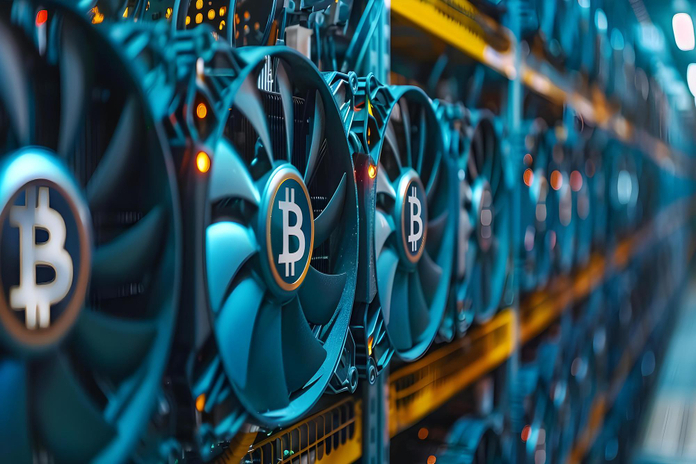As U.S. technology companies race to expand their artificial intelligence and cloud computing data centers, they are increasingly targeting energy assets held by bitcoin miners. This AI data center expansion is driving a surge in U.S. power demand, the fastest since the turn of the millennium, which has led to fierce competition for electricity resources. Major tech companies, including Amazon (NASDAQ:AMZN) and Microsoft (NASDAQ:MSFT), are at the forefront of this scramble, seeking vast amounts of power to fuel their growing AI ambitions.
AI Data Centers Drive Power Demand
The rapid expansion of AI data centers has become a significant factor in the U.S. energy market. These centers are expected to consume up to 9% of the nation’s total electricity by the end of the decade, more than double their current usage, according to the Electric Power Research Institute. Currently, data centers account for 1%-1.3% of global electricity consumption, while bitcoin mining consumes approximately 0.4%. This gap is expected to widen as AI data center expansion continues.
The demand for electricity from AI data centers is putting immense pressure on the energy-intensive cryptocurrency mining industry. Some bitcoin miners have found themselves in a favorable position, making substantial profits by leasing or selling their power-connected infrastructure to tech companies. Others, however, are struggling to secure the electricity needed to sustain their operations.
Tech Giants Outbid Bitcoin Miners for Energy Resources
The AI data center expansion has led to a bidding war between tech giants and bitcoin miners for power assets. For instance, Marathon Digital Holdings (NASDAQ:MARA), the world’s largest publicly traded bitcoin miner, expressed interest in a nuclear-powered data center owned by Talen Energy in Pennsylvania. However, Amazon, with its significantly larger market capitalization, ultimately acquired the center in a deal announced in March. This acquisition secured Amazon enough electricity to power nearly all the homes in New Mexico.
This growing interest from technology companies in power assets traditionally held by bitcoin miners reflects a broader shift in the market. Miners who own substantial land and energy resources are increasingly pivoting from exclusive cryptocurrency mining to offering their services to AI and cloud computing businesses. TeraWulf, a bitcoin mining company with a site in upstate New York capable of up to 770 megawatts, has received interest from major tech firms like Amazon and Google (NASDAQ:GOOG).
The Economic Potential of AI Data Center Expansion
The economic potential of AI data centers has not gone unnoticed by the cryptocurrency mining industry. A study by Morgan Stanley revealed that repurposing bitcoin mining facilities for AI and cloud computing could increase their value by up to five times. By buying or leasing space at a miner with at least 100 MW of capacity, technology companies can reduce the launch time for a data center by about 3.5 years, saving billions of dollars.
However, this transition is not without challenges. The infrastructure required for AI data centers is far more sophisticated than that needed for bitcoin mining. Most bitcoin mines can be constructed in six to twelve months, whereas building an AI data center typically takes three years. This difference in complexity means that many miners would need to rebuild their facilities to meet the specialized cooling and infrastructure requirements of AI and cloud computing.
The Tough Road Ahead for Bitcoin Miners
Not all bitcoin miners are eager to make the switch to AI. CleanSpark (NASDAQ:CLSK) CEO Zach Bradford has expressed skepticism about the ability of most bitcoin miners to successfully transition to AI data center operations. He stated that CleanSpark would continue to focus on crypto mining as its core business, citing the high costs and technical challenges associated with building AI data centers.
The financial barriers to entering the AI data center market are significant. Many bitcoin miners, who were largely cut off from capital markets after the 2022 bitcoin price crash, lack the funds necessary to compete with tech giants. Sergii Gerasymovych, CEO of EZ Blockchain, highlighted the disparity in financial resources between crypto miners and tech companies. In one instance, his company lost a 10-MW project to a hyperscaling AI company with billions of dollars at its disposal.
As the race for energy resources intensifies, bitcoin miners must decide whether to adapt to the new landscape or risk being pushed out by the growing dominance of AI and cloud computing.
Featured Image: Freepik




